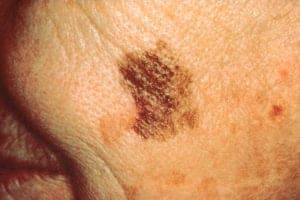Skin cancer is the most common type of all cancers, and its deadliest form – melanoma – can spread quickly through the body, ravaging other organs and resulting in an 80 percent death rate when it’s caught late.
But a new discovery shows that scientists may have figured out a way to stop this deadly scourge in its tracks.

Researchers at Michigan State University used a small-molecule chemical compound, which they created and originally used to treat the autoimmune disease scleroderma, to halt the proliferation of melanoma cells.
In trials, the drug reduced the spread of melanoma cells by up to 90 percent, according to research in the journal Molecular Cancer Therapeutics. The researchers also found that the drug reduced the size of melanoma tumors in the lungs of mice.
Related: White Wine May Increase Risk of Melanoma
“The majority of people die from melanoma because of the disease spreading,” said Richard Neubig, a Pharmacology professor at Michigan State University and co-author of the study. “Our compounds can block cancer migration and potentially increase patient survival.”
More than 75,000 people were diagnosed with melanoma in 2016, and health research shows that the lifetime risk of suffering from melanoma is 2.5 percent among whites – or about one in 40 people. The disease is far less likely to impact blacks and Hispanics.
How Non-Proliferation Therapy Works
The drug compound used by the Michigan State researchers works by suppressing proteins in melanoma tumors from engaging in a transcription process that, when left unchecked, allows the tumor cells to spread to other parts of the body.
Specifically, the drug targets Myocardin-Related Transcription Factors (MRTFs) and stops them from initiating the gene’s transcription process. In many cases, a protein known as Ras homology C, or RhoC for short, activates the MRTF transcription process, which can lead to rapid proliferation of the cancer cells.
The “signaling pathway,” a coordinated effort between MRTF and RhoC proteins, is only turned on in some individuals, explain the researchers.

By targeting the MRTF proteins and halting their activity, the drug compound essentially turns off the switch that allows melanoma cells to metastasize. The researchers believe the next step in the process is to figure out which patients have the signaling pathway turned on.
“The effect of our compounds on turning off this melanoma cell growth and progression is much stronger when the pathway is activated,” said co-author Kate Appleton, a postdoctoral student at Michigan State. “We could look for the activation of the MRTF proteins as a biomarker to determine risk, especially for those in early-stage melanoma.”
Related: New Technique Could Detect Skin Cancer Without a Biopsy
“It’s been a challenge developing small-molecule drugs that can block this gene activity that works as a signaling mechanism known to be important in melanoma progression,” said Neubig. “Our chemical compound is actually the same one that we’ve been working on to potentially treat the disease scleroderma, which now we’ve found works effectively on this type of cancer.”
Scleroderma is an autoimmune disorder affecting about 100,000 people in the U.S. that can lead to kidney disease, lung inflammation and gastrointestinal issues.
For now, the researchers plan to conduct additional studies to repeat their promising findings.
Richard Scott is a health care reporter focusing on health policy and public health. Richard keeps tabs on national health trends from his Philadelphia location and is an active member of the Association of Health Care Journalists.


![How To: ‘Fix’ Crepey Skin [Watch]](https://cdn.vitalupdates.com/wp-content/uploads/2017/05/bhmdad.png)












